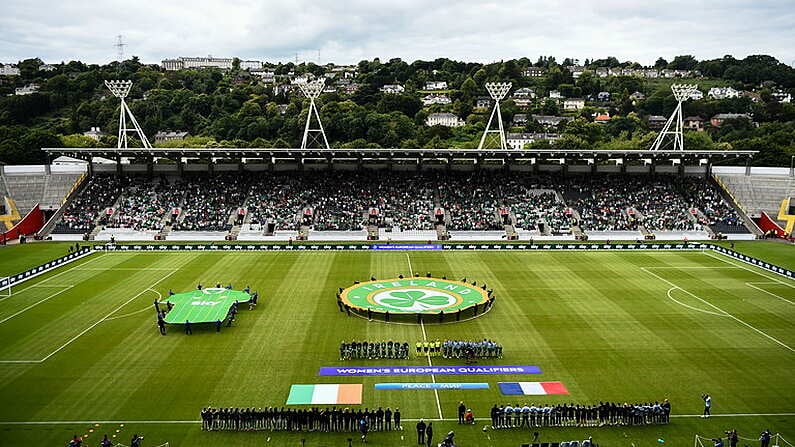In this part of the world, international breaks are to be dreaded and rarely enjoyed. Moans and groans about the temporary stoppage of domestic football are commonplace: meaningless games against minnows, poor standard of football, crap atmospheres. Fans, pundits and managers alike all gripe about international football.
That may be the case for residents of UEFA countries, but in South America it is a whole other ball game. It is home to undeniably the best World Cup qualification system in the world.
CONMEBOL, the football confederation for the continent, has a relatively small pool of countries but perhaps the highest concentration of talent, featuring the likes of Lionel Messi, Neymar, Philippe Coutinho, Luis Suarez, Alexis Sanchez, Sergio Aguero, Paulo Dybala (I could go on and on). Their teams have won 45% of all World Cups, while only one team -- Venezuela -- has never managed to qualify.
While the trend of winners has been ebbing away from South America and back towards Europe in recent tournaments, their qualifying process is still the best -- and that has a lot to do with the format.
Ten countries enter into a league three years ahead of the finals, playing each other twice home and away as they've for four automatic spots. The fifth-placed team in the group goes into an inter-confederation playoff, traditionally against the best team from the Oceania Football Confederation. With plenty of places up for grabs among several very competitive sides, it has always been the most exciting of all the confederations.
You rarely get complete blowouts like you see in Europe when a team such as, say, Germany faces a San Marino. As author and football journalist Euan McTear tells Balls, playing away from home is never easy.
Not only are all of the teams competitive, but even the worst of the ten are good at home, often because of their impressive home supports or the altitude.
Euan does worry, however, about what effect the expansion of the World Cup will have on the CONMEBOL qualifiers, warning that it could lose some of its sparkle.
Currently, one big name has to miss out every time, But that won't be the case for much longer when they allow one extra team to qualify each time.
For now at least, we can enjoy it for what it is, as last night showed.
Brazil, being miles ahead of the pack, have already qualified, but behind them is an extremely condensed group where just six points separated Uruguay in second and Paraguay in seventh.
Before the night began, all eyes were on Chile and Argentina’s respective games, as they were considered the ones most in danger of missing out. Meanwhile, Paraguay still had an outside chance just behind the main group, needing a win versus Colombia to have any chance, although ESPN journalist Paul Carr put their chances of qualifying at 8% before the night began.
While one might think that such a format might lead to plenty of dead rubbers come the end of the process, Brazil-Bolivia was the only truly meaningless game heading into last night.
Argentina, armed with their ridiculous firepower upfront, faced Peru, a nation that hadn’t qualified since 1982. Surely they would find a way through?
Not so. Despite having the majority of possession and chances, they couldn’t find a way through. Although it ended 0-0, the game was captivating; watching this resolute defence take a stand against the mighty Argentines, and the greatest player in the world spurning chance after chance.
On the flipside, La Albiceleste failed to create enough clear cut chances. Their forwards were too static, standing still instead of making runs and creating space to open up the defence. The ball would be pushed out wide repeatedly, despite the fact that it simply wasn’t working. In fact, the wide areas is one of the areas where they very much lack an edge. For all their world class talent though, they looked a team without ideas.
Argentina have scored just two goals in five games - a record that mirrors the Republic of Ireland’s. Their reliance on Lionel Messi has become counter-productive, stifling what should be the most feared front six in world football.
Argentina's 22 shots and 2.72 xG are both the most in a game by any CONMEBOL team that did not score this qualifying cycle.
— Paul Carr (@PaulCarr) October 6, 2017
In Chile, meanwhile, a massive tie with Ecuador was taking place at the same time. The away side’s chances of World Cup qualification were slim, but still had an outside shot. A win would put them level with Chile on points before a final day encounter with Argentina. In other words, this was a must-win game for both sides, and it played out as such.
Former QPR winger Eduardo Vargas got the opening goal for the hosts after 22 minutes, and were determined to hold onto the lead. Romario Ibarra had other ideas, striking an equaliser with just eight minutes to go. Disaster for the Copa America champions, and a major lifeline for Argentina. It didn’t last long though, as Alexis Sanchez turned up right when they needed him to, restoring their lead three minutes later. They hung on for a vital win.
Alexis Sanchez's goal for Chile against Ecuador. #AFC #Arsenal pic.twitter.com/fVrQr17r4y
— AFCPressWatch (@AFCPressWatch2) October 6, 2017
A game of equal importance that was taking place at the same time, although not as many people were taking notice of, was Colombia versus Paraguay. A win would see the Colombians take their place in Russia next summer, while a draw would also put them in a relatively strong position heading into their last fixture against Peru.
It looked to be going their way when Radamel Falcao, who missed the World Cup in 2014 due to injury, scored with just eleven minutes of normal time left on the clock. As the dumbest cliché in football goes though, they scored too early. Through super subs Oscar Cardozo and Antonio Sanabria, Paraguay somehow won it at the death. Arsenal’s David Ospina made a right hames of the two situations, but it’s also fair to say that the entire defence bottled it right when they needed composure. Now they are in serious jeopardy of going out.
Just like that the complexion of the table was changed in the space of a few exciting minutes.
Chile jumped ahead of their closest rivals and into the automatic spots, while Paraguay have given themselves an outside chance of qualifying, should they win and at least one other team to do them a favour. On Wednesday they face Venezuela, easily the worst team in the group. They will be keeping half an eye on Peru versus Colombia, as one of those is guaranteed to drop points. Paraguay will be hoping to go to Russia at the expense of one of them, and with their fixture being the last of the lot to kick-off, there will be a lot of nails bitten down to quick waiting nervously for the final result at Defensores del Chaco.
Although Ecuador have nothing left to play for, they won’t be pushovers and the Argentines’ form would suggest a win is far from a formality: their last competitive win was a 1-0 victory over Chile in March, before losing 2-0 to Bolivia at home and drawing against Uruguay and Venezuela. If they do manage to get the three points though, there is every chance they will make the playoffs, where they would face New Zealand.
Five teams are now battling it out for three spots, meaning there will be four mouth-watering games on show next week. Uruguay are all but through to the World Cup thanks to their superior goal difference, meaning their match with Bolivia is the only dead rubber in the final round of games. Whatever happens this coming Wednesday, we are guaranteed drama, excitement and the prospect of at least one really good team being bitterly disappointed.
Let’s face it: CONMEBOL has it so good.
An earlier version of this article was originally published on Where The Owl Sleeps, a blog from The Final Third Podcast.












